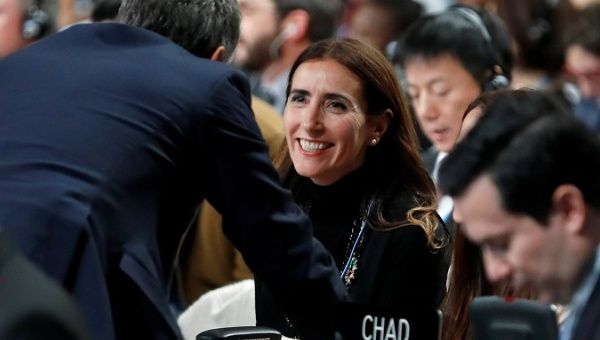Minister of Environment of Chile and President-designate of the 25th Session of the Conference of the Parties (COP25) to the United Nations Framework Convention on Climate Change (UNFCCC), Carolina Schmidt, has identified seven priorities for COP25, which holds from Monday, November 11 to Friday, November 22, 2019 in Santiago, the Chilean capital.

Schmidt, who spoke on Friday, July 12 in New York during the seventh UN High-level Political Forum on Sustainable Development (HLPF 2019), listed the priority areas to include: ambition in implementation; rules for carbon market mechanisms; climate finance; science for climate solutions; adaptation and loss and damage; forests and food security; and oceans and climate change.
Speaking during a session that reviewed the implementation and interrelations among Sustainable Development Goals (SDGs), on SDG 13 (climate action), and SDG 16 (peace, justice, and strong institutions), she however disclosed that gender would be a crosscutting theme.
Another speaker, Leena Srivastava, Co-Chair, UNSG’s Science Advisory Group for the Climate Action Summit, said the rhetoric on interlinkages between the SDGs and climate action is not matched by action on the ground due to lack of quality data, analytical capability, and leadership empowered to take cross-sectoral decisions.
Javier Manzanares of the Green Climate Fund (GCF), on his part, disclosed that the GCF has directed $5.23 billion in climate finance to 99 developing countries for 110 adaptation and mitigation projects in the last four years, in addition to capacity building and readiness activities.
Mami Mizutori, UNSG Special Representative for Disaster Risk Reduction (DRR), said 90% of the natural disasters over the past 30 years are related to climate change and extreme weather events, and failing to include climate change in DRR plans could negate DRR efforts.
African nations made noteworthy contributions during the discussions.
On SDG 13, Malawi, speaking on behalf of the Least Developed Countries (LDCs), called on the international community to increase support for adaptation and mitigation in LDCs, even as Cote d’Ivoire highlighted the establishment of the National Commission for Climate Change, adoption of climate-related legislation, and updating of its nationally determined contribution.
While Niger underlined the need for link between climate change and security in countries in the Sahel region, Morocco underscored capacity building efforts nationally, and in Africa, and South Africa asked how the GCF would address unfulfilled pledges and losses due to foreign exchange volatility.
Just as the Democratic Republic of the Congo wanted efforts to limit global temperature rise to 1.5°C stepped up, Tanzania announced the adoption of a climate-resilient development plan, and Ethiopia announced plans to implement sustainable urbanisation, build resilient infrastructure, and work towards a green energy transition.
Furthermore, Zimbawbe welcomed a $1 million contribution from the Russian Federation for climate change, while Ghana called on the GCF to move from readiness funding to funding adaptation measures.
Contributing to discussions on SDG 16, Nigeria called for inequality, corruption, illegal financial flows, and illicit arms flows to be addressed, while Kenya called on the international community to create systems for forecasting conflict before it erupts.
